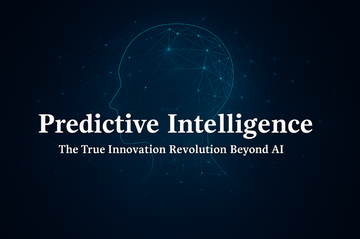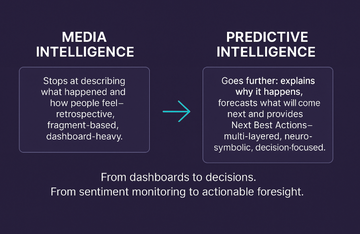Navigating Communication in a FIBS World: The Need for a Paradigm Shift
by Uwe Seebacher on Nov 15, 2023

In our rapidly evolving world, crisis situations in specific areas are becoming increasingly complex, demanding more than just traditional solutions. Amidst this complexity, the crucial role of communication science is often overlooked. Effective communication is not only about conveying messages; it's about understanding and addressing the nuances of various crises. This introduction sets the stage for a deeper exploration of how integrating communication science can enhance our approach to resolving these critical issues.

Decades of Communication Sciences Standstill
Communication sciences, over the past decades, have not significantly advanced, creating a gap between current societal needs and the tools available for effective communication. This was also a major outcome and common understanding of the 2023 Commtech Summit held at Hapag-Lloyd in Hamburg in November,.
This stagnation has left the field poorly equipped to address the dynamic demands of the digital era and a globalized world. The results are more than obvious - fast increasing number of communicative crisis, shirtstorms and the raise of fake news, populists and conspiracy theorists. All this caused by the non-provision of adequate modern communicative concepts and tools.
The rise of populism in politics is omni-present. Why would my sixteen year old daughter in her pre-scientific work even thing about dedicating this first elaboration this topic? Why has the number shitstorms grown from over 1.000 per year within only two years? Populism often thrives on simple, direct messages that resonate with widespread sentiments, creating a strong emotional connection with the audience. It effectively uses rhetoric to frame complex issues in a way that appeals to the general public. This examination raises crucial questions: How do populistic leaders leverage communication to mobilize support? What makes their messaging so compelling to diverse groups? How can understanding these tactics inform our approach to political communication in a rapidly evolving world? But populism is only one phenomenon in our new normal FIBS world, consisting of:
- Fake News
- Isolating Bubble Filters
- Burgeoning Populism
- Storms of Conspiracy Theories

Fake News refers to false or misleading information presented as news. It's often designed to deceive, influence public opinion, or generate profits. The risks include spreading misinformation, undermining trust in legitimate news sources, and influencing political and social decisions based on falsehoods.
Isolating Bubble Filters, or filter bubbles, occur when algorithms selectively guess what information a user would like to see based on past behavior. This can create an echo chamber, reinforcing one's existing beliefs and isolating them from differing viewpoints, which can polarize societies.
Burgeoning Populism is the rise of political movements that claim to represent the voice of the 'ordinary people' against the elite. Risks include the oversimplification of complex issues, the potential for divisive and exclusionary policies, and the erosion of democratic norms.
Storms of Conspiracy Theories involve the rapid spread of unverified, often outlandish explanations for events, typically through social media. These can create distrust in established facts and institutions, fuel paranoia, and lead to real-world harm, such as harassment or violence.
Each of these phenomena poses significant risks to informed public discourse, democratic processes, and social cohesion. Addressing them requires a multifaceted approach, including media literacy education, diversified media consumption, and critical thinking.
The Rise of Shitstorms
The phenomenon of "shitstorms" in the digital age represents a stark symptom of communication failures caused by the standstill of communication sciences and the lack of adequate concepts and tools. These events, often characterized by rapid and aggressive public backlash, primarily on social media, reflect the volatile nature of online discourse. They arise from miscommunications, controversial statements, or actions perceived as offensive, triggering a flood of negative reactions. The impact on public discourse is significant, as these storms can dominate and skew conversations, overshadowing rational debate. They also influence decision-making, as organizations and individuals hastily react, sometimes prioritizing damage control over thoughtful response. Shitstorms highlight the need for more responsible and empathetic communication strategies in our increasingly digital world.

The Communication Science Gap
Communication science, as explored in "Reengineering Corporate Communication," reveals a significant gap in adapting to the demands of modern corporate, political, and institutional communication. This gap is evident in the challenges faced by initiatives like the Green Deals, where the failure to effectively communicate and engage with diverse stakeholders has hindered progress. The shortcomings in communication science, from outdated models to a lack of innovative strategies, underscore the need for a transformative approach to meet the complexities of contemporary communication landscapes.
This is why we developed the Reengineering Corporate Communication approach enabling any kind of organization to adjust their communicational structures to the FIBS world Within 12 months the shortcomings of the past decades in communicational sciences can be overcome. This helps to reduce risks and costs of communication and betters the opportunities for brand activation and gravitation.

Conclusion
In conclusion, the need for a fundamental shift in communication strategies in the context of the FIBS world is clear. The challenges and opportunities of the digital age demand a more dynamic, inclusive approach to communication, as outlined in "Reengineering Corporate Communication." I encourage readers to delve deeper into this topic by exploring the referred book, which offers comprehensive insights. Your thoughts and comments on these ideas are invaluable and I welcome a robust discussion on how we can collectively advance our communication practices.





